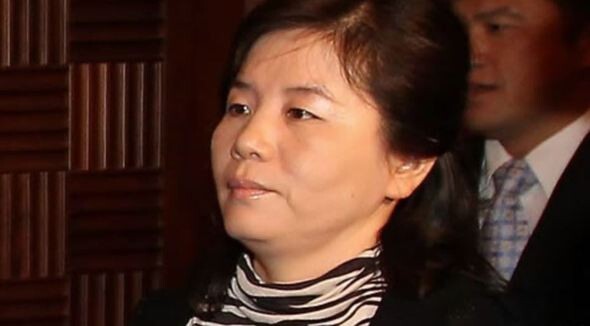hankyoreh
Links to other country sites 다른 나라 사이트 링크
Senior North Korean diplomats visit China, Russia in response to imminent sanctions

Senior officials from the North Korean Ministry of Foreign Affairs have been paying recent visits to China and Russia.
The diplomatic visits are drawing attention at a time when the United Nations Security Council (UNSC) and international community are speeding up efforts to sanction the country over its recent fourth nuclear test, with some predicting that it may be gearing up for a long-range missile launch as well.
Choi Son-hui, deputy director general of the North Korean Foreign Ministry’s US bureau, was reported to have arrived in Beijing en route to a third country for Track II (civilian) meetings with Korean Peninsula experts from the US. A ministry delegation headed by Vice Foreign Minister Pak Myong-guk also visited Russia in what analysts are speculating is part of Pyongyang’s response to imminent sanctions.
Numerous foreign affairs sources reported on Jan. 29 that Choi had arrived in China the previous morning via Beijing Capital International Airport.
Alongside First Vice Minister of Foreign Affairs Kim Kye-gwan and Vice Minister of Foreign Affairs and six-party talks senior representative Ri Yong-ho, Choi is considered one of the country’s key officials in nuclear negotiations.
“Ms. Choi visited China to take part in Track II discussions. While her final destination was not confirmed, my understanding is that it will be US experts on Korean Peninsula issues taking part in the Track II meetings, and no US government authorities plan to attend,” said a foreign affairs source.
The only daughter of former Premier Choi Yong-rim, Choi was reportedly educated in Austria, Malta, and China. She began working in the Ministry of Foreign Affairs in the mid-1980s and has reportedly been in charge of interpreting for major negotiations, including bilateral talks with the US and the six-party talks.
Another Track II meeting with the US was held on Jan. 25 in the Malaysian capital of Kuala Lumpur, sources said, with one reporting that former North Korean Deputy Ambassador to the UN Han Sung-ryul had participated. Han is believed to currently head the US bureau in the Ministry of Foreign Affairs, a government source said.
“Under the current circumstances, no Track II meetings are going to hold much meaning,” the senior official in the South Korean Ministry of Foreign Affairs said.
Meanwhile, the Korean Central News Agency (KCNA) reported the departure of a ministry delegation headed by Pak Myong-guk to Russia from Pyongyang on Jan. 29. No details were given on the reason, schedule, or other participants in the delegation. It is the first visit to Russia by a ministry delegation since the nuclear test earlier this month.
A permanent member of the UNSC, Russia has been opposed to forceful sanctions against North Korea. Speaking during a New Year’s press conference on Jan. 26, Minister of Foreign Affairs Sergey Lavrov stressed that “absolutely the only way [to resolve the North Korean nuclear issue] is through resuming the six-party talks.”
Lavrov was also dismissive of South Korean President Park Geun-hye’s proposal of a five-party talks framework excluding North Korea, saying it was “not a good idea.”
Russia has also announced plans for a major expansion in trade with North Korea. Just after attending the recent Davos Forum, Minister for the Development of the Russian Far East Alexander Galushka was quoted in a Jan. 26 interview with Russia’s state-run Tass news agency as saying the country would be “beefing up development in the Far East and greatly expanding trade with North Korea.”
By Kim Jin-cheol, staff reporter
Please direct questions or comments to [english@hani.co.kr]

Editorial・opinion
![[Column] Season 2 of special prosecutor probe may be coming to Korea soon [Column] Season 2 of special prosecutor probe may be coming to Korea soon](https://flexible.img.hani.co.kr/flexible/normal/500/300/imgdb/original/2024/0426/3317141030699447.jpg) [Column] Season 2 of special prosecutor probe may be coming to Korea soon
[Column] Season 2 of special prosecutor probe may be coming to Korea soon![[Column] Park Geun-hye déjà vu in Yoon Suk-yeol [Column] Park Geun-hye déjà vu in Yoon Suk-yeol](https://flexible.img.hani.co.kr/flexible/normal/500/300/imgdb/original/2024/0424/651713945113788.jpg) [Column] Park Geun-hye déjà vu in Yoon Suk-yeol
[Column] Park Geun-hye déjà vu in Yoon Suk-yeol- [Editorial] New weight of N. Korea’s nuclear threats makes dialogue all the more urgent
- [Guest essay] The real reason Korea’s new right wants to dub Rhee a founding father
- [Column] ‘Choson’: Is it time we start referring to N. Korea in its own terms?
- [Editorial] Japan’s rewriting of history with Korea has gone too far
- [Column] The president’s questionable capacity for dialogue
- [Column] Are chaebol firms just pizza pies for families to divvy up as they please?
- [Column] Has Korea, too, crossed the Rubicon on China?
- [Correspondent’s column] In Japan’s alliance with US, echoes of its past alliances with UK
Most viewed articles
- 1‘We must say no’: Seoul defense chief on Korean, USFK involvement in hypothetical Taiwan crisis
- 2Why Kim Jong-un is scrapping the term ‘Day of the Sun’ and toning down fanfare for predecessors
- 3Two factors that’ll decide if Korea’s economy keeps on its upward trend
- 4After election rout, Yoon’s left with 3 choices for dealing with the opposition
- 5BTS says it wants to continue to “speak out against anti-Asian hate”
- 6AI is catching up with humans at a ‘shocking’ rate
- 7Noting shared ‘values,’ Korea hints at passport-free travel with Japan
- 8Gangnam murderer says he killed “because women have always ignored me”
- 9South Korea officially an aged society just 17 years after becoming aging society
- 10Ethnic Koreans in Japan's Utoro village wait for Seoul's help